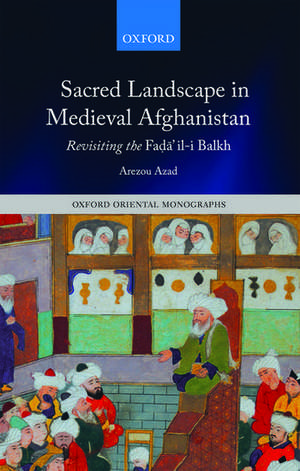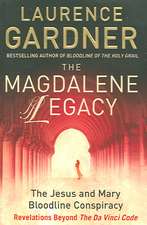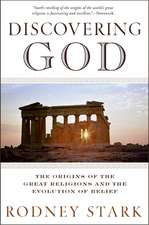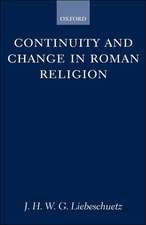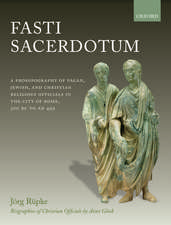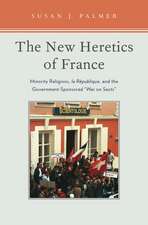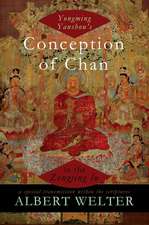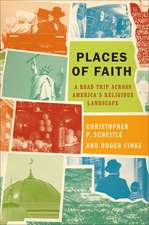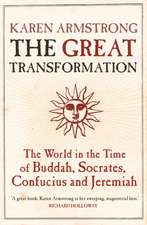Sacred Landscape in Medieval Afghanistan: Revisiting the Faḍā"il-i Balkh: Oxford Oriental Monographs
Autor Arezou Azaden Limba Engleză Hardback – 11 dec 2013
Din seria Oxford Oriental Monographs
- 12%
 Preț: 630.12 lei
Preț: 630.12 lei - 30%
 Preț: 629.86 lei
Preț: 629.86 lei - 20%
 Preț: 522.93 lei
Preț: 522.93 lei - 34%
 Preț: 1417.38 lei
Preț: 1417.38 lei - 34%
 Preț: 1110.63 lei
Preț: 1110.63 lei - 34%
 Preț: 1256.35 lei
Preț: 1256.35 lei - 34%
 Preț: 1333.19 lei
Preț: 1333.19 lei - 34%
 Preț: 1182.92 lei
Preț: 1182.92 lei - 30%
 Preț: 795.57 lei
Preț: 795.57 lei - 34%
 Preț: 1004.91 lei
Preț: 1004.91 lei - 34%
 Preț: 828.96 lei
Preț: 828.96 lei - 34%
 Preț: 1596.01 lei
Preț: 1596.01 lei - 30%
 Preț: 587.48 lei
Preț: 587.48 lei - 12%
 Preț: 305.34 lei
Preț: 305.34 lei - 30%
 Preț: 614.17 lei
Preț: 614.17 lei - 26%
 Preț: 516.75 lei
Preț: 516.75 lei - 23%
 Preț: 746.06 lei
Preț: 746.06 lei
Preț: 801.87 lei
Preț vechi: 1154.64 lei
-31% Nou
Puncte Express: 1203
Preț estimativ în valută:
153.46€ • 159.79$ • 129.69£
153.46€ • 159.79$ • 129.69£
Carte tipărită la comandă
Livrare economică 24 februarie-03 martie
Preluare comenzi: 021 569.72.76
Specificații
ISBN-13: 9780199687053
ISBN-10: 0199687056
Pagini: 240
Ilustrații: 13 colour plates, 7 b/w in-text figures, 3 maps
Dimensiuni: 144 x 222 x 23 mm
Greutate: 0.46 kg
Editura: OUP OXFORD
Colecția OUP Oxford
Seria Oxford Oriental Monographs
Locul publicării:Oxford, United Kingdom
ISBN-10: 0199687056
Pagini: 240
Ilustrații: 13 colour plates, 7 b/w in-text figures, 3 maps
Dimensiuni: 144 x 222 x 23 mm
Greutate: 0.46 kg
Editura: OUP OXFORD
Colecția OUP Oxford
Seria Oxford Oriental Monographs
Locul publicării:Oxford, United Kingdom
Recenzii
Arezou Azad has produced a splendid, focused, and well-written monograph on a text that has attracted little attention beyond a small coterie of Iranologists ... Though a number of scholars have made use of Faḍā?il-i Balkh for the history of Sufism, Islamic law, and religious history, Azad's book is by far the most substantial treatment of the text ... This book should be read widely by students and scholars of pre-modern Islam.
a thoroughly well-researched study that will bring significant new light to an area of Central Asia, which has been neglected in modern scholarship and will provide further impetus to the study of medieval Perso-Islamic historical writing.
This is a work of major importance for scholars ... The achievement of the author is in her meticulous analysis.
a richly documented, penetrating study of aspects of religious and cultural life in one of the great cities of the Islamic East.
Sacred Landscape in Medieval Afghanistan integrates an erudite textual analysis with a multilayered history of urban space and the people who endowed it with meaning. In Azad's hands, the city of Balkh comes alive, as do the concerns of its medieval inhabitants ... One finishes [the book] with an appreciation for Balkh as place, a site endowed with layers of meaning that have inspired pride and pilgrimage for centuries.
an important contribution to our understanding of the history of medieval Balkh.
a thoroughly well-researched study that will bring significant new light to an area of Central Asia, which has been neglected in modern scholarship and will provide further impetus to the study of medieval Perso-Islamic historical writing.
This is a work of major importance for scholars ... The achievement of the author is in her meticulous analysis.
a richly documented, penetrating study of aspects of religious and cultural life in one of the great cities of the Islamic East.
Sacred Landscape in Medieval Afghanistan integrates an erudite textual analysis with a multilayered history of urban space and the people who endowed it with meaning. In Azad's hands, the city of Balkh comes alive, as do the concerns of its medieval inhabitants ... One finishes [the book] with an appreciation for Balkh as place, a site endowed with layers of meaning that have inspired pride and pilgrimage for centuries.
an important contribution to our understanding of the history of medieval Balkh.
Notă biografică
Arezou Azad is Lecturer in Medieval History at the University of Birmingham. She is the founder and co-Director of the Balkh Art and Cultural Heritage project, funded by the Leverhulme Trust and based at the University of Oxford. She received her D.Phil. from the University of Oxford in 2010. She has published several articles on medieval Balkh and the Faḍā"il-i Balkh, the city's earliest surviving local history of which she is preparing a revised Persian edition and English translation. Prior to joining academia, she served as a peacekeeper and development worker for the United Nations and non-governmental organisations in a number of countries, including Bosnia-Herzegovina, Brazil and Timor-Leste.
